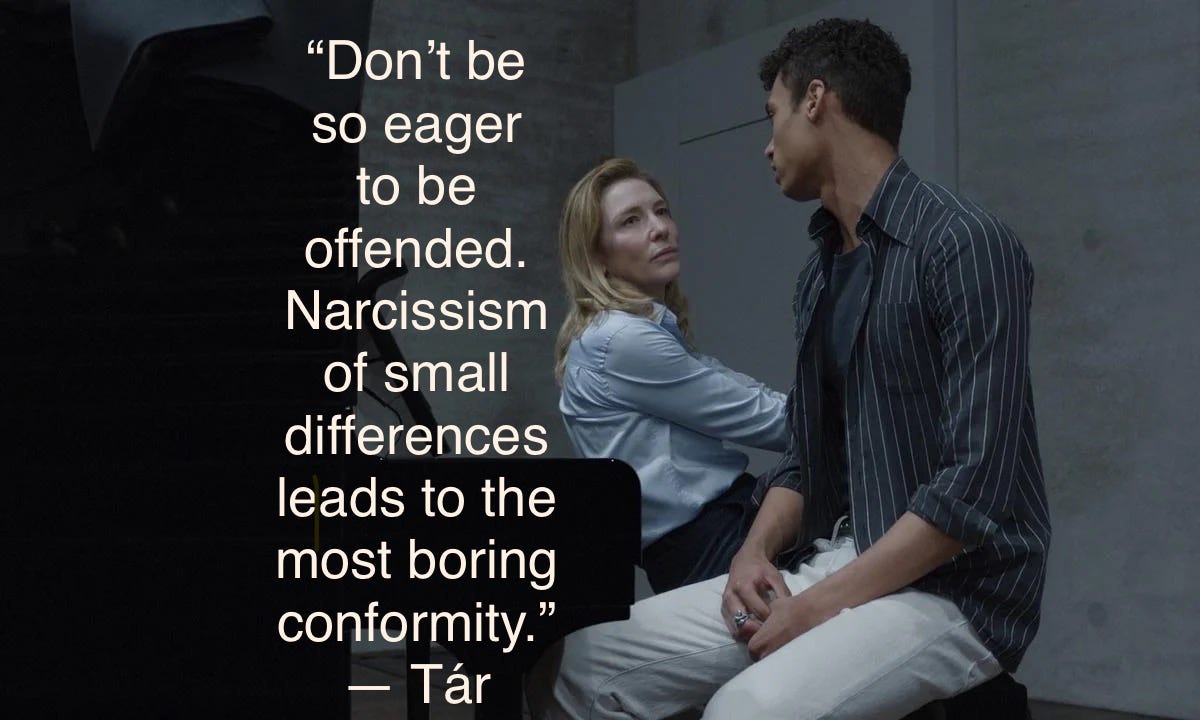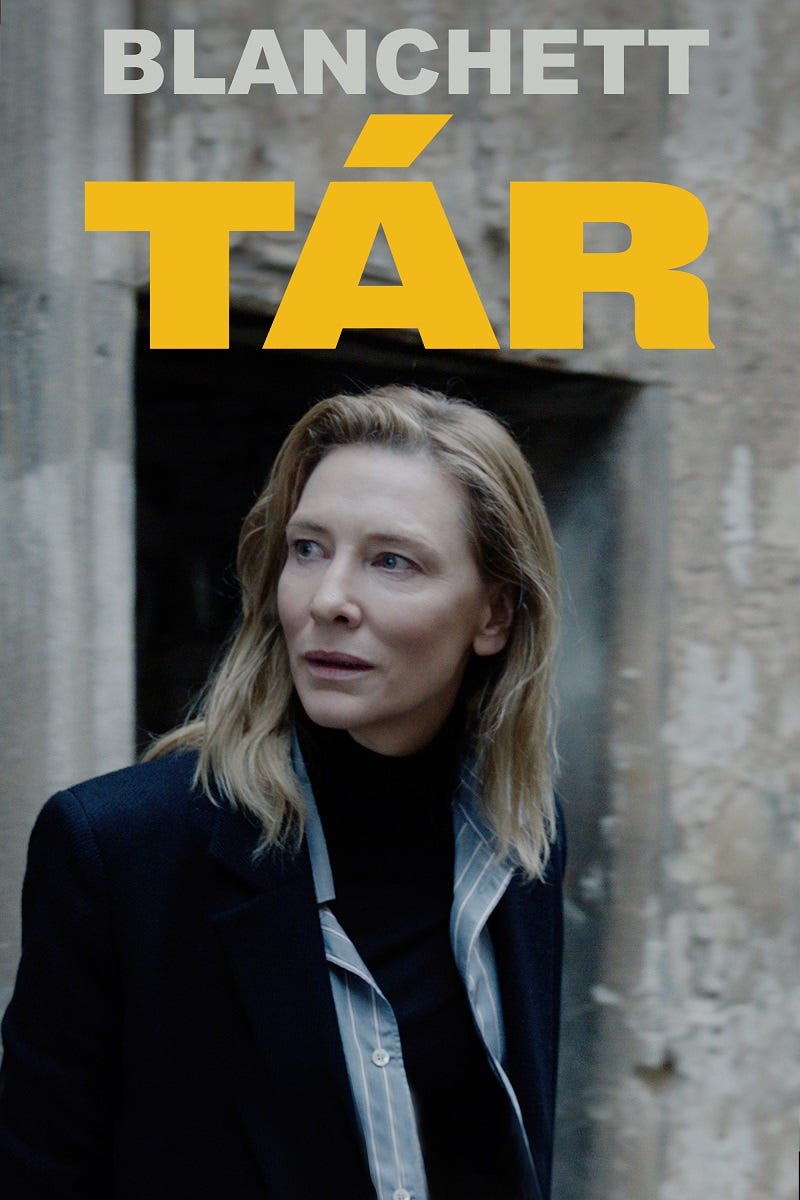Tár: themes of identity politics, cancel culture, a social credit system, and morality police are strongly driven by various forms of censorship.
A film commentary containing *Spoilers*
Ultimately, the heart of this film is about the ironies of identity politics and the dangers of cancel culture.
My favorite line is
“Don’t be so eager to be offended.
Narcissism of small differences
leads to the most boring conformity.”
- Lydia Tár
Unfortunately, this brilliant, significant and all too true line, is delivered by the film’s protagonist: a transparent, gaslighting manipulator (what society currently deems a “narcissist”). The line is received by a Juilliard student with a fragile, bruised ego (what society currently deems a “snowflake”) who will go on to retaliate via a vindictive cancel culture campaign. The not-so-subtle message is that unpopular truths get cancelled similarly to China’s social credit system and Iran’s Morality Police, which America is beginning to blindly adopt and follow.
The student later betrays Tár with a highly damning video that’s been edited to fit the narrative of how Tár made the student feel, versus what Tár actually said (something I’ve dealt with my entire life as a person who rocks the boat by holding up the mirror and calling out unpopular truths). We cannot control how people emotionally react to our words, we can only control what we say; but so few people seem to be capable these days of separating philosophical statements about the world, or a situation, from how those statements make them feel personally.
Sometime, in the last decade or so, we’ve collectively embraced an erroneous belief that our personal views on anything are the only views that matter. This point was driven home when the book “Challenge,” which was given as a gift to Tárfrom a former student who later kills herself. “Challenge” is a real book known for its dedication, “This book is yours, honoured witch. If you read it, you will find your tormented soul changed and free.” The audience can take this at face value as being directed to Tár or it can look deeper and see that it could be directed to the audience to allow themselves and their truths to be “challenged,” as the title of the book implies.
In the beginning of the film, a convincing case is made that the woman who kills herself is emotionally troubled and her suicide (as anyone’s suicide) should not be blamed on Tár. However, by the end of the film, the student’s death is added to a mounting pile of evidence against Tár which includes the false truth of the edited video and her list of character flaws (a foundation of transactional relationships and betrayal of those who have been loyal to her) creating a compelling case that Tár is responsible for the death of the student. As the audience, we get to experience in real time how we allow tribalistic thinking to choose our views depending on which side our team lands. As such, we witness our own purview being manipulated and shifted through the film.
Tár’s teaching of a master class at Juilliard was my favorite scene in the film. It was filled with insights about the harm that can be caused when we throw the baby out with the bathwater and cut off our noses to spite our faces—when we focus on the bold extremes of black and white thinking and disregard the nuanced shades of truthful color in between, particularly in identity politics, which paralleled what I’ve written in chapter 15: Identity, in “Sage Words COURAGE Book Two.” What I love about this scene is that we get to be the jury and see the evidence firsthand of what was really said. We know she was innocent, at least in the classroom. However, as the narrative changes, so too does our judgment. We conflate her guilt in other areas, clouding our judgment of her innocence in the classroom. It’s a powerful illustration of what happens daily in mass media, social media, and many a campaign disguised as “news,” no matter on what side of the political aisle you sit.
The final scene reveals the message of the film, that we as a society have become “Monster Hunters” (the name of the video game Tar is conducting to a scene for a group of cosplayers). The themes of identity politics, cancel culture, a social credit system, and morality police are strongly driven by various forms of censorship—a topic I am deeply desperate to awaken people to. (I’ll link a short video here).
The most urgent message of all is that censorship is a nonpartisan boomerang. Do not be fooled into believing that you stand on “the right side” of anything, so much so that it justifies censorship. The fallout of censorship eventually hits all sides, each and every one of us, which is why I make bold statements in the name of freedom that can be seen as either liberal (stand for reproductive freedom) or conservative (stand for medical freedoms), when the truth is they are simply both humanitarian medical freedoms regarding body autonomy.
As I’m fond of saying, the world doesn’t need another person to point out its problems, we need instead for people to point to solutions; so I leave you with the solutions of empathy and rationale—an excerpt from Chapter 18: Call Out Culture versus Cancel Culture in “Sage Words FREEDOM, Book One.”
“If we don’t arrive as a community and illustrate a reminder of empathy to the one who committed the offense, we don’t give them a chance to self-correct. This is one of many dangers in living in a society so dangerously divided: we stop seeing the nuance of truth that may be present in the other side that can lead someone into delusional thinking or destructive behaviors. If we can’t see why they think the way they do, why do we expect them to see why we think the way we do?
We are all perfectly imperfect works in progress. When we make mistakes, we must address them. “Cancel culture” doesn’t allow for the kind of growth that comes from remorse, and introspection, that can lead to reparation, forgiveness, and sustained change; but “call out or call in culture” does. If we don’t call it out, how will anything change? If we cancel it, we don’t allow it to change.
Cancel culture is also destroying the voice of powerful allies. It has made some celebrities quietly complicit for fear of being cancelled. When people fear speaking truth to power, moral courage dies a slow and painful death that affects us all. We do more good when we call people in to corrective action, than we do when we cancel and shun.”
Photo of Sage Justice by Margot Hartford
Sage Justice is achingly sincere. Balancing wisdom and humor she most often writes deeply personal solution based pieces about the enduring virtues that connect us all: love and healing. She is an award-winning playwright and critically acclaimed performing artist who has appeared on stages from Madison Square Garden in New York City, to The Comedy Store in Hollywood, California. Ms. Justice is the author of Sage Words FREEDOM Book One, an activist, a member of the Screen Actors Guild and an alumna Artist-In-Residence of Chateau Orquevaux, France. She is a co-founder of The Unity Project which fuses activism with art, to educate and inspire, with a special emphasis on community engagement to end homelessness. She has a series of short reels about living with the rare genetic disorder, Vascular Ehlers-Danlos Syndrome that you can find in a highlight reel on her Instagram page @SageWords2027.




